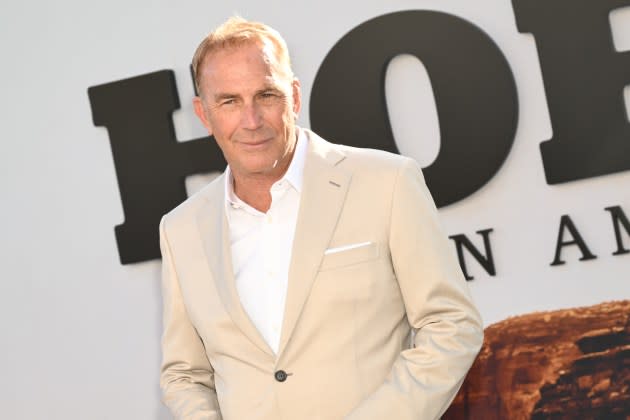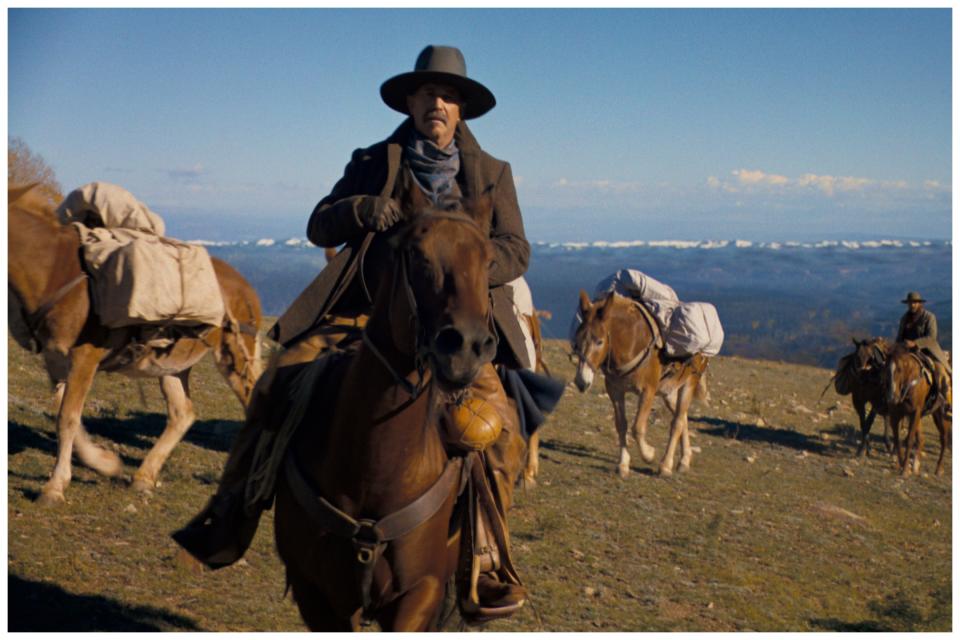Inside Kevin Costner’s Big Gamble as His Self-Financed Western Epic ‘Horizon’ Opens

A covered wagon’s worth of ink has been spilled in recent weeks on “Horizon: An American Saga,” the potentially ruinous three-hour dice roll that writer, producer, director and star Kevin Costner makes this weekend when the first of four planned films about the American West opens in theaters.
You’ve probably heard that the films — long-gestating passion projects from a movie icon who in recent years reclaimed his cultural relevance with the hit series “Yellowstone” – are pricey. The first cost $100 million to produce and will be followed only weeks later by its sequel. You’ve also likely seen headlines where Costner bluntly revealed he spent $38 million of his own cash to get the movies made, an unusually candid disclosure from an A-lister who has been forced to bet on himself. Maybe you’ve seen the box office projections, predicting that the film will take home a troubling $10 to $15 million in its opening weekend, or the reviews, which averaged to a dismal 40% positive on Rotten Tomatoes.
More from Variety
What you might not know is the backstory that led him to this moment. It comes at an inflection point in traditional moviemaking in Hollywood – where directors like Costner and Francis Ford Coppola (with his lightning rod “Megalopolis”) have had to go it alone to fulfill bold visions that were not seen as commercially viable by studios or streamers.
As it stands, the “Dances With Wolves” Oscar-winner mortgaged prime undeveloped real estate in Santa Barbara, Calif. to cough up his piece of the action, and raised additional financing for the films through mysterious investors. His longtime studio partner Warner Bros. is in the mix as a distributor for hire. However, the company isn’t spending any of its own money on “Horizon,” not even for marketing.
But Costner’s saga was originally shopped as two films. Warner Bros. came in as an interested party prior to a 2022 merger with Discovery. Then known as WarnerMedia, its CEO Jason Kilar had given a mandate to his studio chief at the time, Toby Emmerich: release one “quality movie” per month exclusive to streaming, according to three sources familiar with that regime. HBO Max was the fledgling service now known as Max, and millions were being spent in pursuit of content that would help lure subscribers to compete with the likes of Netflix (what a difference three years makes, as streaming budgets today couldn’t be tighter while corporations scramble to monetize their platforms).
Emmerich and his team were approaching the project as package acquisition, insiders said, meaning Warner Bros. would be on board to finance both films. Costner would be a splashy get for a straight-to-streaming movie, and the actor was a company man. Warner Bros. has released some of Costner’s career-defining films, including “JFK” and “The Bodyguard.” He was also recruited for franchise properties like DC’s “Man of Steel,” playing the adoptive father of Superman. But after AT&T ended its disastrous marriage with WarnerMedia and Discovery merged with the studio, the game changed. Costner went to its new leaders Michael De Luca and Pam Abdy with a different vision – not only to give “Horizon” a wide theatrical release but to make two additional films, bringing the count to four movies. The films unfold over a 12-year span, before and after the American Civil War, as a large ensemble of characters seek better lives in new terrain.
Max’s streaming mandate for movies had changed overnight, but De Luca and Abdy wanted to honor the studio’s relationship with Costner, sources said. The package was briefly developed under the Warner Bros. Label, New Line, but the economics soon became troubling (the New York Times reported this week that the studio has a small financial stake in the first two chapters of “Horizon.” A representative for the studio wouldn’t comment, but one source close to the film said those costs would have been related to development expenses at New Line).

Costner was uninterested in scaling down his vision, and therefore had to go out on his own and find the funds. Production on the second “Horizon” project received $14 million in tax incentives from the state of Utah. In return for distributing the film in the U.S. and select international territories, Warner Bros. will receive roughly 8% of the “Horizon” box office grosses, two insiders said. Costner and his backers are footing the bill for marketing. Numerous film marketers who spoke anonymously with Variety said the P&A spend on the film is easily $30 million, which two sources close to the situation confirm is accurate. The studio had no comment.
The Warner Bros. motion picture marketing team, led by Josh Goldstine, designed the campaign in concert with Costner, and took some interesting swings to engage audiences. Some exhibitors have sold tickets to the first two installments of “Horizon” as a discounted pair or offered free concessions for attending the sequel.
Costner himself has done a dizzying amount of promotion in hopes of capturing the audience of mostly adult men who love his work on “Yellowstone” as patriarch John Dutton. That audience powered the show to a huge 12 million viewers per episode for some episodes and making it the single most-watched show on television. Sources argue that demographic rarely gets captured in box office tracking and could, against all odds, turn out and boost opening weekend numbers. Costner’s press tour included cameos at baseball games and local radio hits and affiliate morning shows near military bases to connect with these crowds.
There’s a subliminal message behind all of Costner’s stumping: He’s asking audiences to invest in and uphold his own star power, in the form of bucking consumer habits and making his film a watercooler moment in the age of streaming convenience and TikTok distractions. This message has been so insistent that even People magazine is writing stories about how “gratifying” Costner finds the studio support from Warner Bros.
His campaign has not been as well received as, say, Coppola’s — whose “Megalopolis” is a self-financed spectacle that occasionally borders on the avant garde, and has been embraced as a rejection of an industry obsessed with profits and allergic to risk. Costner’s audacity may be in the cool confidence he’s projecting despite massive risk to his reputation and pocketbook.
Representatives for Costner declined to comment on this story. This weekend’s box office results, perhaps, will do all the talking.
Best of Variety
Sign up for Variety’s Newsletter. For the latest news, follow us on Facebook, Twitter, and Instagram.


